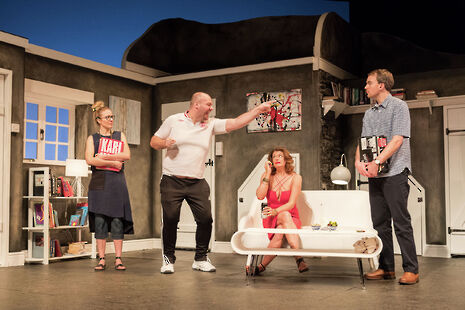Review: Invincible
“When they seek to make us laugh, we roar hysterically and when they want to shock us, we are left horrified and devastated to the core,” writes Anna Shmatenko, impressed with this nuanced and evocative production

Invincible, an incredibly thoughtful piece of new writing by Torben Betts, was originally carved specifically for the London stage. Refusing to let the brilliance of this play run its course so soon, however, The Original Theatre Company decided to take this not-altogether-unfamiliar story out of its comfort zone, discovering that it isn’t just London folk who can explode into fits of genuine laughter and even tears in response to what Betts calls his ‘entertaining tragedy’.
It is unsurprising that now that Invincible hits the Cambridge stage, we show total readiness to embrace the story of the cultural clash between the middle and the working classes which ignites when the London couple first meet their new neighbours after relocating to a small town up north. After all, the comic situations Invincible presents us with resonate with our daily experiences in a place where it usually takes a while before we can meet someone who can recognise our accent and postcode as their own.
"The awkwardness that characterises their interactions is almost palpable, yet painfully recognisable"
In the play's first act, the characters that occupy the stage are walking and talking stereotypes, embodying the conflicting spirits of the North and South. The awkwardness that characterises their interactions is almost palpable, yet painfully recognisable, which causes us to laugh almost against our will, as we recognise ourselves and our own neighbours in Betts’ characters. However, the comedy in a play about conflicting ideologies can only last so long, and soon the laughter is suddenly replaced by wide-eyed shock. When Emily (Emily Bowker), the left-leaning radical, first expresses her desire to live amongst ‘ordinary people’, she never could have guessed that at one point the comical façades of her ‘uneducated’ neighbours would peel away, revealing raw emotions of real people struggling through life underneath.
As the play progresses, the sense of harsh reality is drilled into the audience members, as more unhealed wounds of the two families come to the surface. We learn about lost children, lost purpose and lost happiness, the shared traumas that should bind the two families together, yet only deepen the void between them. The many confessions in the second act of the play make it possible for the cast to expose the depths of their individual characters as well as their own inexhaustible creative talents. It is with great skill that the actors start demolishing the stereotype cocoons of their characters. However, this intense moment in which we are finally forced to confront the realities of these characters, is over way too soon and we are left yearning for a third act, which never follows.
"It is with great skill that the actors start demolishing the stereotype cocoons of their characters"
David Morgan’s careful arrangement of costumes undeniably contributes to the success of the characters’ initial archetypal appearances, making the characters’ struggles all the more shocking when they are finally uncovered. The set is an accurate recreation of a recognisably London house interior, which Oliver (Alastair Whatley) and Emily comfortably inhabit. However, we are never allowed to forget how out-of-sync this house is with the outside world, which intervenes whenever Alan (Graeme Brookes) and Dawn (Elizabeth Boag) uninvitingly (or even invitingly!) stroll in. We are not surprised when two ‘movers’ reconfigure the set at the end of Act 2, littering the stage with half-filled boxes of possessions. After all, this disassembling of the set takes place immediately after the first private on-stage interaction between Alan and Dawn, whose troubles seem too real to be contained within the artificiality of Oliver and Emily’s home, which sends them back to ‘where they came from’.
The eloquent naturalism of acting is only diluted during transitions, such as when Dawn first comes in on stage, like a model striding the catwalk, as emphatic blue lights dance on the set pieces and her figure, or when we first meet Alan, as he runs in in slow-motion, raising his fist up high in celebration of the national football victory, accompanied by sports commentary in the background. These are the moments when all of theatre’s vital organs work together to hype up the comedy of the piece.
Another remarkable example is the moment when Alan, angered at England’s loss in his favourite sport, first appears in the second act – the reflective screen at the back of the set pulsates with smudged orange spots of light and the overpowering sound of a heartbeat is quickening rapidly in anticipation of the worst.
The collective genius of Torben Betts’ writing and Stephen Darcy’s directing is immensely powerful in its evoking of the audience’s emotions. When they seek to make us laugh, we roar hysterically and when they want to shock us, we are left horrified and devastated to the core. It is incredible how the piece achieves such a wide range of responses in such a short period time – and it is incredible how effortlessly it makes us feel human
 Comment / Plastic pubs: the problem with Cambridge alehouses 5 January 2026
Comment / Plastic pubs: the problem with Cambridge alehouses 5 January 2026 News / Cambridge businesses concerned infrastructure delays will hurt growth5 January 2026
News / Cambridge businesses concerned infrastructure delays will hurt growth5 January 2026 News / Cambridge academics stand out in King’s 2026 Honours List2 January 2026
News / Cambridge academics stand out in King’s 2026 Honours List2 January 2026 News / AstraZeneca sues for £32 million over faulty construction at Cambridge Campus31 December 2025
News / AstraZeneca sues for £32 million over faulty construction at Cambridge Campus31 December 2025 Interviews / You don’t need to peak at Cambridge, says Robin Harding31 December 2025
Interviews / You don’t need to peak at Cambridge, says Robin Harding31 December 2025









